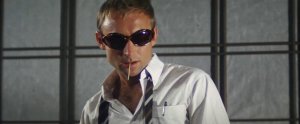
Rest in peace Kenpachiro Satsuma, your spirit will live eternally.
To say that Godzilla Minus One is my most anticipated movie of the year is a severe understatement. It currently holds the candle for my most anticipated movie ever. The wait has been agonising, less so for my brother who I brought along for what is our first experience seeing Godzilla on the big screen. For the better part of December seeing Letterboxd members gushing about it has been terrifying. But finally, I managed to catch a screening today, 2 days after its UK debut, by god, it was worth every minute, every second... this is the best Godzilla movie to date, bar none.Feeling as if he unfairly cheated death too many times, Shikishima, a surviving Kamikaze pilot is attacked on Odo Island along with many war plane engineers by an enormous monster. After the engineers die due to Shikishima failing to distract the monster, an overwhelming amount of guilt weighs on him, especially after a homeless woman and a baby move into his home when he returns. Shikishima, now on a personal mission, teams up with a large group of veterans to finally take down the monster known only as Godzilla.
Having spent the better part of a week watching Takashi Yamazaki's other directorial efforts certainly didn't prepare me for what he would bring to the table with Minus One. Choosing a post-war setting for the movie invited some rather minor scepticism but the film ended up an extension and refinement of his earlier wartime epic, The Eternal Zero. Tension and redemption run high throughout this film, with everyone seeking a path forward in the face of utter destruction and hopelessness.
Yamazaki's proficiency for human drama was not in question, having watched his Always Sunset trilogy the other week, emotions run high and his characters inject so much life and soul into the picture. It's backed by an utterly terrific script, heartfelt and often awe-inspiring and his calling his direction anything less than superb feels wrong.
I still can't believe that Yamazaki and company pulled this off for the money they had, either Hollywood blows their film budgets in all the wrong places or Japanese VFX artists are severely underpaid for the job they do (maybe it's both). Godzilla is one scary-looking bastard, taking his main influence from the Heisei suits but blown up with scales and spikes added into places you didn't know he had, his presence throughout the film is one of constant overhanging dread, cropping up when the characters least expect him and terrifying all who see him. Seriously, the build-ups to his atomic breath gave me constant goosebumps and seeing him standing amongst the ruins of Ginza just sent shivers down my spine.
I could technically accuse Yamazaki of nepotism given how many of his regulars take on roles here but I'm not going to. Everyone gives it their all, especially given the immense weight they had to carry on their shoulders, everyone is incredible, I can't fault a single performance. Ryunosuke Kamiki especially did a stellar job, the emotional resonance of his dialogue leaves you hanging on every word, Minami Hamabe is the rock to his PTSD-ridded life and the two of them share beautiful chemistry.
Naoki Satō's music is just phenomenal, his music carries so much menace and unease but thoroughly compliments Yamazaki's incredible style, there's a beautiful use of pure silence (especially in the climax) to emphasise both creative forces. His utilisation of the classic Ifukube cues is hands down one of the best of the entire franchise, cropping up at just the right time to not feel out of place or irrelevant.
Godzilla Minus One is truly the first of the franchise to make me truly afraid, the Big G's villainous stance hangs over the picture with a looming dread that remains unshaken even when the credits roll. Putting the trauma of history at its core was an inspired creative choice, evoking the original film more than any other since GMK (which Yamazaki lists as his favourite, based). Everything about this film works and exceeds any expectations I had of it, with its emotional heart just as prevalent as its terror. I'm so glad my brother was along for the ride, no way I was experiencing this alone.
Was this review helpful to you?
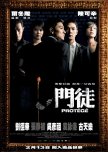
Unflinchingly tense
A gripping, often uncompromising look at the Hong Kong drug trade, Protégé takes a tried and tested storytelling formula and marries it to compelling cinematic finesse caught up in a cobweb of drugs, loyalties and deceit. Mercifully unpretentious, the film is directed with remarkable proficiency by Derek Yee, offering a look at both sides of the drug coin: those who profit from it and those who ultimately suffer from it. By keeping it more personal, Yee's film feels more intimate and urgent, more satisfyingly intriguing, helped in no small regard by its star power. A greyed-up Andy Lau is as great as ever, offering up a sympathetic spin on an otherwise purely business-focused drug lord, while Daniel Wu plays off of Lau with a subtle and controlled rage. With its smart script, solid acting and tight directing Protégé varies from intense drama to dreamlike to subtle shades of black comedy yet never feels like an afterschool special or an obvious morality tale.Was this review helpful to you?
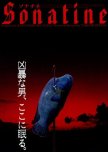
Joe Hisaishi's music destroys me
From its hypnotic style to its pessimistic plot, Sonatine is a mesmerizing manifestation of Takeshi Kitano's continued revitalisation of the yakuza movie. It is a largely peaceful, contemplative work, punctuated by moments of extreme violence all delivered with purpose balancing the fine line between gorgeously dreamy and grim reality. Kitano's haunting elegy to the gangster way of life, he spends the film exposing the gangster ideal as the myth, of little boys who forget to grow up, doing so with incredible flourishes of style, playfulness and jarring outbursts of his trademark humour. Having only written four scenes, the vast majority of the film was largely spontaneous, often Kitano finding his feet in the moment at hand. Sonatine sees the bleak suicidal tendencies of Kitano's mind coming right to the forefront, especially since he suffered partial facial paralysis after a motorscooter accident not long after this film's release. One he has often mentioned was an unconscious suicide attempt, this alone lends a massive amount of weight to the Russian Roulette sequences, giving Sonatine so much more emotional levity to its already unconventional narrative. With the addition of another stunning musical score by Joe Hisaishi, Sonatine rewards those with patience, offering up plenty of existential dread among its exceptional beauty.Was this review helpful to you?
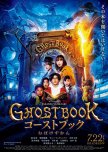
Juvenile 2.0
Ghost Book feels deeply reminiscent of Yamazaki's debut film, Juvenile (hell, even the adorable little Tetra makes a cameo appearance), a lighthearted family romp often dealing with some relatively difficult themes for its target audience. There's an element of Pokémon thrown into the narrative with the film's characters tasked with "catching them all", benefiting this narrative hook is the lovely monster design, stellar voice work by legendary voice actors such as Akio Otsuka and Rie Kugimiya; and their impressive realisation capturing the essence of Etsuyoshi Miyamoto's original illustrations brilliantly. Unfortunately, the characters are all exceptionally one note, despite the cast's rather heartwarming performances they are probably the most laid-back group of ghostbusters ever, often characterised by very limited personalities (I swear Kudo is just a few steps away from being a full blow serial killer) or singular traits. There's no urgency with this film, it just kind of chugs along at its own pace, often leaving room for a nice family dinner despite the race to get home. That being said, Ghost Book operates on a level of childish fun, obvious in its sentiment and simplistic in its messages. However, it makes up for its narrative wateriness with a wholesome vibe you can't bring yourself to hate.Was this review helpful to you?
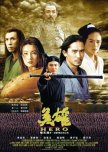
Questionable stance but oh so beautiful
For all of Hero's striking use of colour and landscapes, the drama, characters and ideas are not sufficiently compelling enough to sustain the martial arts. It's easy on the eyes, but too segmented to gather much momentum and too art-directed to convey much urgency. However, I can't deny the result. Both thrilling and thoughtful, offering imaginative and meticulous set pieces as it considers questions of loyalty and the individual's role in history. It is not so much a historical epic as a kind of highly determined ballet: dreamy with bloodless violence, relying less on shades of character than on magnificence of gesture. For all my grievances, the performances of its leads are captivating, Dun Tan's score mesmerising, while Christopher Doyle's photography is overwhelmingly stimulating. Hero is a dazzlingly lensed, highly stylized meditation on heroism even if its ideology is confused.Was this review helpful to you?
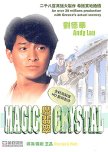
Seriously underrated madness
One part ET, another part Indiana Jones but a Wong Jing movie in every other sense, Magic Crystal has everything and the kitchen sink cheesed up to the max, but dosed on adrenalin too. Wong Jing's signature chaotic direction, balls-to-the-wall pace, brutal stunt work, cheesy yet ridiculously charming effects and humour that ranges from childish to outright offensive but it's presented in such a way that it remains hilarious. Topped off by an incredible cast that includes the likes of Andy Lau, Cynthia Rothrock and an awesomely villainous Richard Norton all of whom commit 100% to the film's stupidity. It's over the top and knows it, delivering endless, ferocious and well-choreographed action all set to a rocking synth score that has become a staple of most 80s Hong Kong movies. Daft, dumb and oh-so-fun, Magic Crystal is one you owe yourself to watch if you are in any way a fan of shlocky excellence. Then again I also gave 5 stars to Future Cops... so you decide.Was this review helpful to you?

Sammo does John Woo
If you only know Sammo Hung for his more happy-go-lucky roles, then Eastern Condors will be a massive shock to the system, going as far as to tread into John Woo's territory of heroic bloodshed. Taking the idea of The Dirty Dozen but setting it in Vietnam, Sammo got serious with this one, even cutting his trademark hair and slimming right down. There are no mincing words about how brutally violent Eastern Condors gets... Hands get chopped off, Vietcong kids play Russian Roulette and people are shot point blank with no hesitation, in the wrong hands it's distasteful stuff, but Sammo treats it all with sincerity, marking this film out as one of his finest accomplishments as an actor, martial artist and director.Although the majority of the action is hyper-intense gun fights occasionally punctuated by a familiar moment seen in Western war films like The Deer Hunter or the Rambo franchise, there is a spectacular final bout of full-contact fisticuffs for the patient ones among you. The cast is populated by plenty of familiar names and faces, although I do wish they got a bit more characterisation outside of their nicknames and who plays them, they all commit often coming away bloody and bruised from the hyper-dangerous stunt work. For better or worse, Eastern Condors has a gritty edge that makes it truly stand out amongst Sammo's filmography often feeling like what Heroes Shed No Tears had originally wanted to be, it's an absolute must-see!
Was this review helpful to you?
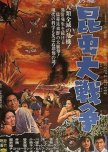
Exhausting
Exceptionally convoluted and deliriously nihilistic, Genocide is appropriately harrowing and periodically bonkers if a little middling around the second act. The second of only two movies from director Kazui Nihonmatsu, having previously helmed The X from Outer Space, Genocide is all over the place with enough hair-brained ideas to fill two movies let alone a single 84-minute one, primarily the hallucinogenic bees being bred by an insane holocaust survivor. Nihonmatsu handles the film with considerably more skill than his prior effort, there's a wider variety of shots and a better building of suspense thanks in part to the photography of Shizuo Hirase and the passable score from Shunsuke Kikuchi. It's very much an accident of a film, suitably ambitious and apocalyptic in its finality, ultimately hinging on the potential detonation of a hydrogen bomb and the single mother who may have to single-handedly repopulate a country. Genocide is an exhausting yet very rewarding experience, showcasing so pretty damn good filmmaking for its small budget but, as noted before, has too much plot for its own good.Was this review helpful to you?
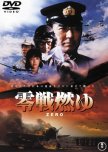
Another one for the “Toshio Masuda is one of Japans most underrated directors” pile.
There's something strangely perfect about Zero being directed by Toshio Masuda, having been kicked out of the kamikaze in 1944 for being excessively liberal and pacifistic. It's a real treat to finally see another one of his war epics after so many years, this time him and him alone in the chair. Based on a serialized story by Kunio Yanagida, this is the story of the Mitsubishi Zero through the eyes of the engineers who designed the plane and the pilots who flew it.Shoichi Hamada is a pilot flying the Imperial Navy's ace in the hole, the Mitsubishi A6M Zero, during the first years of the war the Zero is seemingly unstoppable, shooting down almost every type of plane the allies send at them. Hamada's best friend is Kunio Mizushima, assigned to the ground crew, they are both in love with one girl… but will the ravages of war tear them apart?
Toshio Masuda's direction is simply sublime, taking what worked on Tora! Tora! Tora! over a decade ago and bringing it back tenfold. It is clear Masuda had no love for war and thus directs the film with a dash of gritty realism, unflinching in its portrayal of death, bad decisions and ultimate endeavour for a lost cause. By stark contrast when the film isn't wowing you with its climatic and brutally intense battle sequences, it shines with a glorious use of colour.
The plotting is well done, keeping the story of the Zero first and foremost while framing the story of the young pilot around it. Masuda seemingly backhands the naval authorities for using the pilots as expendable property. In general, the film has no respect for higher authorities, portraying most of them as simply using their soldiers, and not caring about their lives. The story is told in reverse, starting from 1944 and going in reverse to 1937. The pacing is well done, keeping everything at about the same level.
The acting is great on most parts, and even the expats seem to be doing well, it's often noted how poor a lot of them were in Japanese films of the era but here they do a standup job. As for the main characters, they are directed with enthusiasm that goes with their youthfulness. The love triangle is directed well but in a way, it's almost like a precursor to the later Michael Bay shakey-cam fest, Pearl Harbour, ending on that usual "war romance" subversion.
Daijiro Tsutsumi as Hamada brings all sorts of emotions to the table, and by the end, it is clear the Japanese war machine has become him. Kunio Mizushima, played by Jun Hashizume, shows clear concern for his friend as well as a great love for the female love interest, Shizuko Yoshikawa. Shizuko Yoshikawa, herself is a very well-done love interest. She clearly has a mixed bag of emotions for the two leads and loves them both on different levels. Tetsuro Tamba's brief appearance as Isoroku Yamamoto casts him as a very sympathetic man, clearly concerned for the lives of his young pilots despite only appearing for about 5 minutes. Shin Takuma does well as Teruo Tojo, the Zero's financier and Mitsubishi Motors president, showing quite a youthful energy and enthusiasm for his character.
The special effects by later Biollante to Destoroyah Effects Director Koichi Kawakita are very well done, clearly showing off just as much enthusiasm for pyrotechnic effects as his teacher Teruyoshi Nakano. The miniatures look great, and it’s nice to see a few Zero miniatures portrayed accurately as white in the opening 30 minutes. The camera angles during the air battle scenes are daring, and Kawakita makes use of frenetic camera movements during the battle scenes to enhance the combat. There is quite a bit of stock footage in the film, all the way from Storm of the Pacific to Kawakita's own Zero Pilot and to The Imperial Navy, but the original effects all look fantastic and blend very well with Kawakita's efforts.
The music by Harumi Ibe has a dated late 70s-early 80s quality that actually works for the film, and the score uses a lot of horns as well as 70s-style guitar work that make it clear Ibe was primarily used to the 70s style of composing and hadn't quite made the jump to the 80s sound design yet. Even then it's a great score and the film's theme song, Dawn, is sung beautifully by Yujiro Ishihara. Befitting the film's historic ending scene well.
Overall, I can't recommend Zero enough. It's clear how much Toho bought their A-Game in 1984, between this, The Return of Godzilla and Sayonara Jupiter, their tokusatsu efforts were on top form. If you ever get the chance to see it, do so.
Was this review helpful to you?
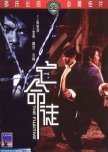
No, not that one
77 minutes of wildly outrageous spaghetti western excellence, The Fugitive mixes fantastic gun-fu style action with the standardised Shaw Brothers martial arts formula, all scored by some of Ennio Morricone's finest music, it's almost as if someone was peaking at my Christmas list. Featuring a plethora of badass moments, the majority coming from leading man Lo Lieh, amidst the flurry of wonderfully gratuitous blood sprays, there's no denying the unique approach to this hybridisation of crowd-pleasing genres, often so over-the-top that you could never take it seriously. But that's where its charm lies and I couldn't ask it to do more. The threadbare story is perhaps its weakest element, but anyone who loves a good revenge tale can easily overlook this, besides, who needs a great story when you score your revenge with Morricone?Was this review helpful to you?
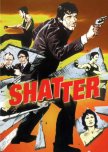
The other Hammer / Shaw Bros Collab
The other Hammer / Shaw Brothers collaboration, Shatter’s conception predates The Legend of the 7 Golden Vampires, as it was originally pitched as a Canadian co-production before being confined to a shelf for a few years and then resurrected as part of the collaboration deal. Rather than a period drama as both companies were used to producing, Shatter sees the action transported to contemporary Hong Kong and it's used to great effect, even if it amounts to nothing more than a lot of glorious eye candy. The film ran into many problems during production and this is evident in the finished product, the editing is off by a beat, it doesn't go anywhere very fast and isn't helped by a mediocre script. Stuart Whitman doesn't care about his role, an entirely one-note performance, but he's carried by the indomitable Peter Cushing who always gives 100%, remaining a joyous presence in this otherwise substandard kung fu exploitation. Ti Lung is the actual star here even if he struggles with his English dialogue, the same problem befalls Lily Li. In the end, the novelty value of Shatter probably makes this more of interest to Shaw fans than Hammer fans; although I enjoyed the film, like Golden Vampires, it just left me wanting more from its initial promise, ultimately coming across as incredibly sloppy and rather underwhelming.Was this review helpful to you?
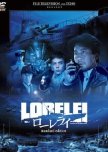
Lorelei: The Witch of the Pacific Ocean
0 people found this review helpful
I expected way better
The directorial debut of Shinji Higuchi, Lorelei very quickly sinks into ridiculous territory despite the promising initial set-up. Sadly, for all the inspiration it can take from Wolfgang Petersen's Das Boot, the humanisation and exploration into the psyche of the submarine crew was not one of them; so much of the film flounders around with nonsensical political undertones that I've seen people criticise Takashi Yamazaki for, yet it's one full display here. Glorifying suicidal charges and glossing over human experimentation as if it were a trivial matter. So much of Higuchi's talent and style isn't here, often coating everything in a horrendous digital sheen; the direction is okay at best but honestly, it could have been anyone else behind the camera, let alone Higuchi. The acting is easily one of the better aspects with everyone turning in solid performances, however, the cast is given so little to work with that all their characters end up as one-dimensional cutouts. The music by Naoki Satō is passable but far from his best work and the less said about the incredibly rough CG effects, the better. I really wanted to like Lorelei going in, but the dubious political alignments and underwhelming filmmaking stamped out any form of entertainment I could have gotten from this, I expected far better.Was this review helpful to you?
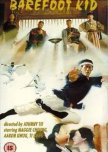
The Shaw Brothers are dead, long may they live
A faithful, if a somewhat unusual tribute to the Shaw Brothers' golden age, The Bare-Footed Kid offers up a simple yet bittersweet narrative of redemption, a coming-of-age drama through a world of capitalism's corrupting influence, injected with a mixture of fresh faces and veteran Hong Kong performers. Johnnie To mixes in his patterned use of energetic camera movement and skilful with a slice of the 90s new-wave kung fu movement. There's a beautiful chemistry between Ti Lung and Maggie Cheung which adds an extra amount of sentimentality and depth to the film and a gorgeous use of colour sprinkled throughout. The action set pieces choreographed by the legendary Lau Kar-Leung more than deliver, it's ultimately the weak script and miscast lead where the film fails to connect with its punches, yet The Bare-Footed Kid sits within the realm of superb entertainment keeping the door open for more innovative Hong Kong action cinema and Johnnie To's eventual move to what he knows best...Was this review helpful to you?
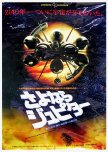
Revolution in the field of space archaeology!
Sayonara Jupiter has been my white whale for so long but finally, after so long, today is the day I have finally managed to sit down and watch it and boy is it so much better than its reputation suggests. I'll admit it's no masterpiece with a fair amount that doesn't quite work and is almost comparable to being a retread of Gorath but on a solar level. I will say that Bye-Bye Jupiter as it's also known, as a whole, it's greater than the sum of its parts.In the 22nd century, scientists from an energy-depleted Earth research new fuel sources in the far corners of the solar system, where they discover an ancient alien race from Jupiter as well as the emergence of an apocalyptically dangerous black hole.
When Star Wars was released in Japan in 1978, the science fiction boom of Japan well and truly kicked into overdrive. Both Toho and Toei tried to capitalise on the success of this reignited love of science fiction with both producing their own takes on Star Wars, The War in Space and Message from Space respectively. Prior to the production of The War in Space, Toho offered a contract to author Sakyo Komatsu to write a science fiction film. Komatsu had long desired to make a film comparable to 2001: A Space Odyssey, taking further inspiration from NASA's Voyager mission to Jupiter and the outer planets. As such this is the only work of Komatsu that had been designed and destined to be a film from the very beginning.
One could argue that Toho didn't know when to tell Komatsu to stop because the film is brimming with so many ideas that it would be enough for a whole trilogy centred around the concepts presented. Just to rattle off the basic bits you have the solarization project, Jupiter Church unrest, an alien race on Jupiter, a black hole approaching, a dolphin named Jupiter and a battle with a shark. It can sometimes feel overwhelming with the amount of stuff you're expected to follow but while the film may lack a distinct focus to it, Komatsu populates the film with his typical philosophical dialogue and discussion. Being over 2-hours long, it lends the film a sense of epic scale to its storytelling but could have used a lot more focus on one distinct idea to truly rise above what it encapsulates.
The film had originally supposed to have been helmed by Submersion of Japan's director, Shirō Moritani but he tragically died the same year due to stomach cancer. Final directorial duties on the film are divided, with Komatsu being credited as the main director but is more often than not thought to have only been the major creative influence on the project and main duties fell to The Return of Godzilla director Koji Hashimoto in the only other director's credit of his career. While ultimately I feel The Return of Godzilla is the more well-rounded film, Hashimoto doesn't half deliver a visual tour-da-force and possibly one of the best-looking films in Toho's tokusatsu library with Bye-Bye Jupiter.
It manifestly demonstrates the same subtle and unpretentious filmmaking style that was also present in The Return of Godzilla. His beautifully coordinated images, combined with some excellent sound engineering and special effects, turn a third-act shootout into one of the film's most immersive sequences. Better still, we have a thematic element that he would later use brilliantly in The Return of Godzilla: a sense of unity. Even at a basic level, Hashimoto remained a humanist to the end.
Major major kudos need to be thrown towards the goat that is Koichi Kawakita in his first major special effects director credit. The film already benefitted from the work of Koji Hashimoto but add in Kawakita's special effects and the film becomes a whole other breed. It's, for a lack of a better word, simply stunning. They are jaw-dropping even by today's standards of miniature effects, the spaceships are rich with detail and, filmed at the proper camera speed, effectively convey a sense of mass and scale as they drift through the universe. Background mattes and optical effects for the stars and planets similarly look wonderful; so good, in fact, that in the few odd moments where the film decides to use a stock image of the real outer space, Kawakita's manufactured effects, oddly enough, stick out as more dynamic. Let's also not forget about the viscous, unrelenting gusts of different-coloured smoke utilized for a scene where a small ship pilots through the storm clouds of Jupiter.
My other major gripe with the film is the characters who are very thin ranging from robotic to mediocre. There are a few performances in there that try and sell the material but being this is a film predominantly shot by a Japanese crew and nearly half the film is also in English it makes some of the already poor actings in some scenes all the worse. It's a crying shame given this was also Akihiko Hirata's final film before his untimely death, Hirata is definitely one of the better players in the film but is given barely anything to do. Tomokazu Miura as Eiji Honda and Miyuki Ono as Anita give okay performances, they are both clearly trying but there seems to be a lack of understanding with some of the material present.
The other element of the film I quickly want to address is the musical score by Kentaro Haneda, who also composed the utterly divine music to one of Komatsu's other film adaptations, Virus. It's a marvellous creation, alternating between softness and sweeping awe in the background. The songs are just as beautiful but are probably more well-known nowadays for being shamelessly stolen by Hideaki Anno for use in Eva 3.0+1.0.
Overall, Bye-Bye Jupiter while being a relative mess is a thoroughly engaging, visual extravagance with one too many things going on and overly long in places. One or two revisions and this could have been a bonified Toho classic.
Was this review helpful to you?
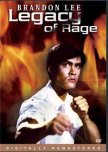
A shining star in Brandon's filmography
Notable for being the late Brandon Lee's first starring role and his only Hong Kong production, Legacy of Rage is an explosive extravaganza and highly entertaining little jewel of Brandon's tragically short career. Yeah, the plot and melodrama are standard eighties action fodder, but Ronny Yu's direction, Lee's reverting presence and exceptional acting chops more than carry the film through the more clichéd aspects of its story. The action possesses a raw intensity and some exceptional choreography which makes it rather a shame there isn't more of it sprinkled throughout the film, however, there's an outstanding climactic car chase and final shootout that feels very much in the vein of John Woo's A Better Tomorrow, all accompanied by a badass score courtesy of Richard Yuen. Given this is the film where Brandon fights Bolo Yeung (who had fought his father in the iconic Enter the Dragon) and featuring a gloriously slimly Michael Wong as its villain, you'd be hard-pressed not to love Legacy of Rage's rough and ready emotional camaraderie.Was this review helpful to you?

